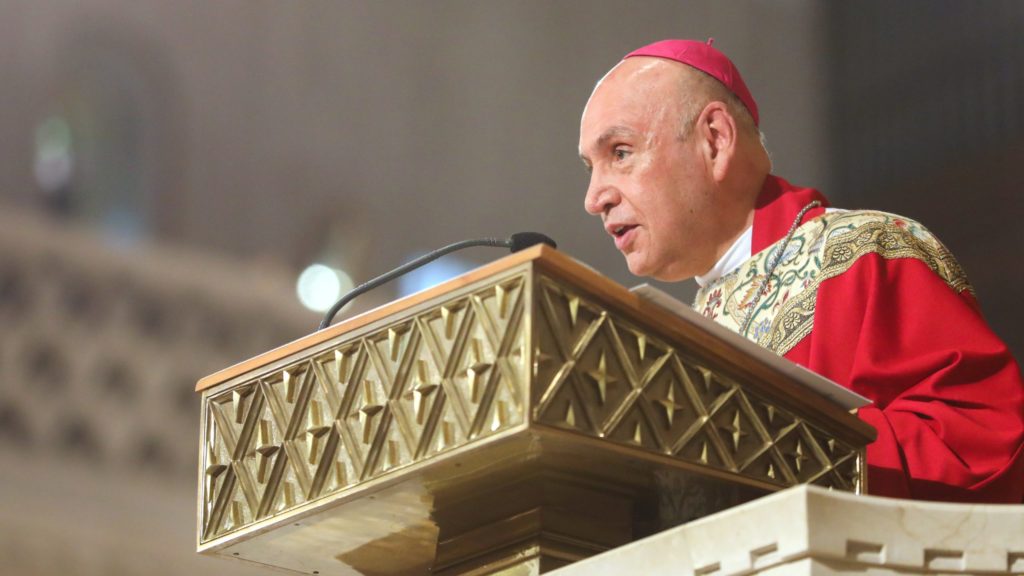Bishop Mario Dorsonville of the Diocese of Houma-Thibodaux in southeastern Louisiana, whose ecclesial career spanned nearly four decades, died unexpectedly on Friday evening after serving as bishop of the diocese for less than a year. He was 63.
In a statement on Facebook, the vicar general of the diocese, Father Simon Peter Engurait, wrote that the bishop died on Friday evening at 6:50 p.m. CST “after he gave in to complications arising from recent health problems.”
Dorsonville was appointed as bishop of the Diocese of Houma-Thibodaux on Feb. 1, 2023, and was installed on March 29, succeeding Bishop Shelton J. Fabre.
Engurait said it was “with great sadness and deep shock” that he made the announcement of Dorsonville’s passing. “My heart is broken as I make this news to you as this is not the kind of message any one of us would expect to receive.” Engurait asked for patience from the flock “as we begin to navigate through these uncertain moments” and called for prayers for the bishop.
Dorsonville undertook his studies for the priesthood at the Theological Seminary of Bogotá, where he received a bachelor’s degree in philosophy and a second bachelor’s degree in sacred theology. He was ordained to the priesthood on Nov. 23, 1985, in Bogotá.
During his early ministry he served in a variety of roles, including as parochial vicar of Immaculate Heart of Mary Parish in Bogotá, chaplain of the National University of Colombia, pastor of San Jose de Calasanz Parish in Bogotá, and professor of ethics at the National University of Colombia.
He continued his theological studies at the Pontificia Universidad Javeriana in Bogotá, earning a licentiate in sacred theology in 1991.
Following the completion of his doctorate in ministry at the The Catholic University of America in Washington, D.C., in 1995, he served in various roles in Arlington, Virginia, including as parochial vicar of Good Shepherd and Christ the Redeemer parishes and as a professor at the Hispanic Apostolate of Arlington from 1993–1994. He was also a lecturer at the Inter-American Development Bank in Washington, D.C.
Dorsonville decided to permanently reside in the United States and was incardinated into the Archdiocese of Washington in 1999.
He held other positions including as vice president for mission of Catholic Charities of Washington and director of the Spanish Catholic Center, and he was adjunct spiritual director for St. John Paul II Seminary in Washington, D.C.
Please pray with me for my friend, Bishop Mario Dorsonville from Houma-Thibodaux, Louisiana, who died yesterday. He was a good bishop, a good priest, and he had a great love for the people he served. I will miss him.
— Abp. José H. Gomez (@ArchbishopGomez) January 20, 2024
He was also a member of the priest council of the Archdiocese of Washington and a member of the College of Consultors of the archdiocese. From 2010–2011, he was a mentor for newly ordained priests for the archdiocese.
Pope Francis named Dorsonville as auxiliary bishop of the Archdiocese of Washington on March 20, 2015. He was ordained to the episcopate a month later at the Cathedral of St. Matthew by the former archbishop of the diocese, Cardinal Donald Wuerl.
Dorsonville was a tireless advocate for migrants and immigration reform. In 2020, the Colombian-American prelate, who previously served as chairman of the U.S. Conference of Catholic Bishops’ (USCCB) Committee on Migration along with Archbishop José H. Gomez of Los Angeles, former president of the USCCB, urged the Trump administration to reinstate the Deferred Action for Childhood Arrivals (DACA) program.
The program, which started in 2012 during the Obama administration, allowed for certain immigrants brought to the U.S. illegally as children to apply for a delay of deportation, where they could also receive a work authorization, despite a recent decision by the Supreme Court.
“Many [dreamers] were brought to this country as infants and young children, and they have grown up in our schools and parishes and now are making important contributions in the Church and in almost every area of American life,” the bishops said in a joint statement.
Dorsonville was active in calling on the Biden administration to continue prioritizing immigration reform, both on the executive level and through bipartisan congressional legislation.
On Oct. 8, 2021, the Biden administration increased the refugee cap for fiscal year 2022 to 125,000, the highest the figure has been since 1993.
“Whether fleeing war, natural disaster, or persecution, the positive contributions of refugees to our society have been well documented,” Dorsonville said at the time. “First and foremost, however, we recognize them as vulnerable members of the same human family to which we ourselves belong.”

